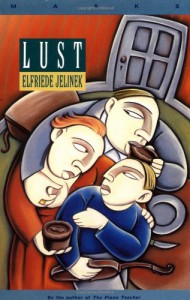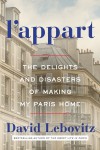19
Followers
19
Following
M Sarki
Besides being a poet with four collections published, M Sarki is a painter, film maker, and photographer. He likes fine coffee and long walks.
M Sarki has written, directed, and produced six short films titled Gnoman's Bois de Rose, Biscuits and Striola , The Tools of Migrant Hunters, My Father's Kitchen, GL, and Cropped Out 2010. More details to follow. Also the author of the feature film screenplay, Alphonso Bow.
Currently reading
L'Appart: The Delights and Disasters of Making My Paris Home
We Learn Nothing: Essays
Elmet: LONGLISTED FOR THE MAN BOOKER PRIZE 2017
Limbo, and Other Places I Have Lived: Short Stories
The Double Life of Liliane
At Home with the Armadillo
American Witness: The Art and Life of Robert Frank
Autumn
Inside Out: A Personal History of Pink Floyd (Reading Edition)
American Witness: The Art and Life of Robert Frank
Lust
 http://msarki.tumblr.com/post/99809431403/lust-by-elfriede-jelinek
http://msarki.tumblr.com/post/99809431403/lust-by-elfriede-jelinekSitting down this autumn to the work of transposing all my hand-written work from last summer onto my computer I am somewhat surprised at how relevant this particular work of Elfriede Jelinek is to what I myself had been impelled to write about. Reading for me is far more than a diversion from my life. This novel makes me think. Clearly I am no longer of the patriarchal and consumer-driven society I have been born into, and I have done my utmost to insure against my falling back into what I so laboriously rid myself of further becoming. Yes, I am married to a woman I have sex with, but never a day passes in which I am not grateful for her and what she does for me. I never feel entitled to anything awarded me except for the continuance of a fair shake and honest relationship. Deceit and covert affronts of power are expressly not my cup of tea.
Elfriede Jelinek is a poet. Or the translator, Michael Hulse, is a poet. It matters not to me who the responsible party is here. Fact is, this novel is a masterpiece in brutal honesty. Fiction as fact. I know these people she writes about and they exist in the world I live in. They always have. They are my neighbors and we live in the same towns.
A third of the way into this beautifully profound though vicious treatise the narrator, after somewhat sarcastically speaking of a factory worker fetching from the dispenser a refreshing Coke, says the word I. She, or he, unhesitatingly and frankly makes strong claims.
Wood is pulped and the pulp is processed at the mill by people who’ve been pulped…
Obviously the opinions voiced in this narrator’s countless personal attacks are broad and thoroughly encompassing. Because of mounting evidence and personal experience I feel confident that Elfriede is not exclusively a man-hater as others have previously suggested. To label her one is totally unfair. Obviously she equally hates all that is oppressive and insanely preposterous, which covers enormous swaths of ground and leaves her much else to expose in the course of her saying so. As for the pitiful women she portrays she clearly positions herself above and beyond them, and in fact holds them responsible for the spousal abuse they receive inasmuch as they are themselves slaves to wanting the things and prestige that only money can buy. This mass disease of consumerism is as much at fault as the worldly desire for more money and property. Through the ages this hunger has undoubtedly proven to feed a vicious cycle of abuse. In matters of sexual behaviors Jelinek goes well over the line in order to be herself appropriately absurd. The gargantuan number of orifices filled and splayed seem almost hilarious and often delightfully insane.
…Nature presupposes sheer scale: anything of a smaller size could never excite us or entice us, tempt us to buy a dirndl dress or a hunting outfit…
She is equally without hope for all who are oppressed. It is the human condition we are born with. Oppressed people the world over resort to life’s foibles to determine the results and direction of their flawed and blemished lives. The ones-in-charge continue to profit and consider themselves superior in their disgusting delusions of grandeur. There are so many of life’s examples to this affect that Jelinek has little trouble digressing and exploring the diverse and meandering avenues and countrysides of our often pathetic and meaningless existence.
…All day long a man lives off the beautiful image of his wife, only to have her nag all evening…She and the village women and all of us, there we stand, dripping and thawing, facing the kitchen stove and counting the tablespoonfuls in which we dole ourselves out…
Unrelenting in her assault of all, and the insults she spews upon us, Jelinek scours her cynical mind for the strongest corrosive agent she may engage. Her courageous honesty is so absurd to be somewhat funny and profanely enjoyable to read. A weaker mind of lesser character could never delight in these scribblings patterned in short paragraphs of hers that never fail to inspire a reader to go on and hear what else she might have to say about these people we all should know and be dreadfully aware of. Otherwise we are one of them as well. Better to be a recreational observer slouched within the stuffing of our leisure chair, devoid of any personal feeling of responsibility that urges us to also merge within these irrelevant lives as additional willing participants.
…Even the station-master’s slender signal baton is almost too much for her. She is obeying her own command. And no one else’s… In the midst of her life, this woman often likes to think she has to get out of her alignment alongside other women with sagging breasts and hopes who have docked beside her…
Jelinek, in her way, promotes self-awareness and personal responsibility. When a reader is offended by these painfully direct accounts and graphic details explicitly made out for us it pauses me to consider the source of their written complaints and credit them to another version of the typically judgmental and self-righteous one who holds little to no credibility based on a typically guilty history. The sensitive man who feels somehow affronted as well is considered also in less than a good light as we are all complicit of these same behaviors and thoughts no matter how hard we impress ourselves and others in our attempts to deny them.
For wary readers it seems Jelinek’s incessant bombardment is meant in order to wear one down. She is anything but taciturn in her sometimes disgusting assaults so perversely avowed. Two-thirds through this generously elongated tirade marks a new measure of tiredness. She flirts with boredom. It is possible the book could have ended at this same mark. But perhaps she still has something new and yet unheard of to say? Surely it is hoped her constant fucking and sucking might beget a new meaning. It is true the hairdresser fails at keeping Gerti fresh. No longer available to Jelinek are any additional analogies for going downhill. Perhaps she could have the fuckers skiing backwards, or perhaps in reverse?
…The woman doesn’t improve from constant use, but if she herself wants to avail herself of a young man, make herself available to a fellow who lives nearby: no, it won’t do! ...
So Gerti degrades herself even more. A husband who uses her every hole to fill and gorge with his own juices and then leaves her soiled and bent with nary a kiss goodbye is still not enough abuse for her so Gerti ventures out to seek more in the shape and forms of youth that are now and forever escaping her.
…But we, us extras, we are so difficult to move, we hang leaden upon our catheters, through which our warm waste waters trickle wretchedly away…
Being drunk and spread out on the snow of her own digging, wanting too much to be loved, enamored of herself, delusional enough so that gangs of young men and women are allowed to expose and fondle, grab and mishandle her hidden places, her creases and folds torn and spread enough to spew their juices laughably, considered by these kids as no longer needed and instead worn and desperately used up.
…Gerti is put in her car. Quiet, now! How shall I put it? She has been at the mercy of hands and tongues…
And for some of us having been roughly groped and fondled like this would be just what we have wanted. An orgy designed for denying personal despair. But not Gerti. She wants the young man Michael and not the rest of what comes with him. The narrator frankly tells us that this woman has to get attached to an asshole like Michael, of all people… He grabs roughly inside the front of her coat and dress, and, laughing, tugs and twists her nipples…
The book is strikingly more about regrets over life choices rather than the popular blurbed-war between the sexes. Poor choices and not being true to one’s self plays into this work in far greater measure than feminism and spousal abuse. On almost every page men and women being caught up in superficial looks and pretentious appearances are shown as contagious diseases prevalent throughout our consumer-driven societies.
…Torn and tormented, we become visible, and we want to look good for others, to think of what we paid for our clothes, we no longer have what we paid and we notice the lack when we have to undress and caress our partner in love…
Defeated, in the world of lust, youth rules. Age is not kind, and life simply wears one out.
…Thus their round fat bodies hum away, life goes on, man vanishes continually in death, the hours sink to the ground, but women flit numbly about the house, never safe from all the blows that fate deals…
There is no hope. And ultimately a god is blamed or held responsible for this creation. It is hard to imagine a work like this becoming popular.
…Flabbergasted, the men gape into their women’s holes, torn by life, and yes, they shudder, as if they knew that the box had long been empty from which the seeds have been shaken out for years. But the dear women are so attached to them...
In this book Elfriede Jelinek has much to say. Of which ample need impels all of us to consider. And where we might also discover why her violence is most driven.







